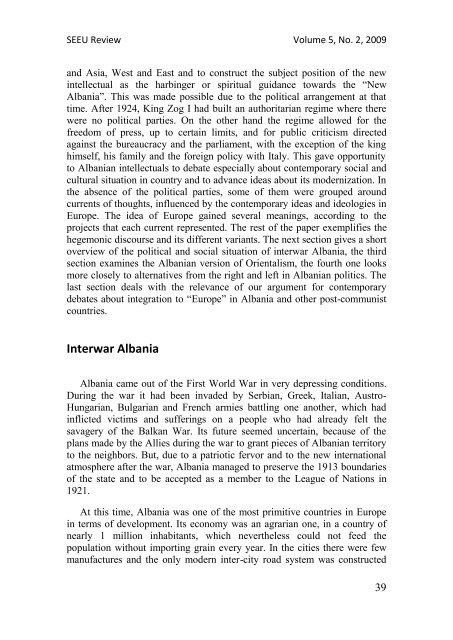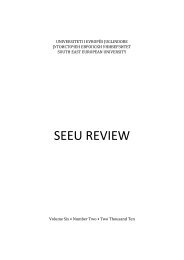SEEU Review vol. 5 Nr. 2 (pdf) - South East European University
SEEU Review vol. 5 Nr. 2 (pdf) - South East European University
SEEU Review vol. 5 Nr. 2 (pdf) - South East European University
You also want an ePaper? Increase the reach of your titles
YUMPU automatically turns print PDFs into web optimized ePapers that Google loves.
<strong>SEEU</strong> <strong>Review</strong> Volume 5, No. 2, 2009<br />
and Asia, West and <strong>East</strong> and to construct the subject position of the new<br />
intellectual as the harbinger or spiritual guidance towards the “New<br />
Albania”. This was made possible due to the political arrangement at that<br />
time. After 1924, King Zog I had built an authoritarian regime where there<br />
were no political parties. On the other hand the regime allowed for the<br />
freedom of press, up to certain limits, and for public criticism directed<br />
against the bureaucracy and the parliament, with the exception of the king<br />
himself, his family and the foreign policy with Italy. This gave opportunity<br />
to Albanian intellectuals to debate especially about contemporary social and<br />
cultural situation in country and to advance ideas about its modernization. In<br />
the absence of the political parties, some of them were grouped around<br />
currents of thoughts, influenced by the contemporary ideas and ideologies in<br />
Europe. The idea of Europe gained several meanings, according to the<br />
projects that each current represented. The rest of the paper exemplifies the<br />
hegemonic discourse and its different variants. The next section gives a short<br />
overview of the political and social situation of interwar Albania, the third<br />
section examines the Albanian version of Orientalism, the fourth one looks<br />
more closely to alternatives from the right and left in Albanian politics. The<br />
last section deals with the relevance of our argument for contemporary<br />
debates about integration to “Europe” in Albania and other post-communist<br />
countries.<br />
Interwar Albania<br />
Albania came out of the First World War in very depressing conditions.<br />
During the war it had been invaded by Serbian, Greek, Italian, Austro-<br />
Hungarian, Bulgarian and French armies battling one another, which had<br />
inflicted victims and sufferings on a people who had already felt the<br />
savagery of the Balkan War. Its future seemed uncertain, because of the<br />
plans made by the Allies during the war to grant pieces of Albanian territory<br />
to the neighbors. But, due to a patriotic fervor and to the new international<br />
atmosphere after the war, Albania managed to preserve the 1913 boundaries<br />
of the state and to be accepted as a member to the League of Nations in<br />
1921.<br />
At this time, Albania was one of the most primitive countries in Europe<br />
in terms of development. Its economy was an agrarian one, in a country of<br />
nearly 1 million inhabitants, which nevertheless could not feed the<br />
population without importing grain every year. In the cities there were few<br />
manufactures and the only modern inter-city road system was constructed<br />
39

















